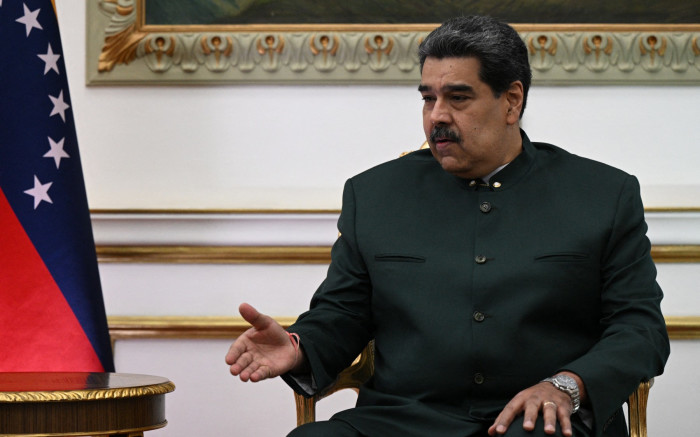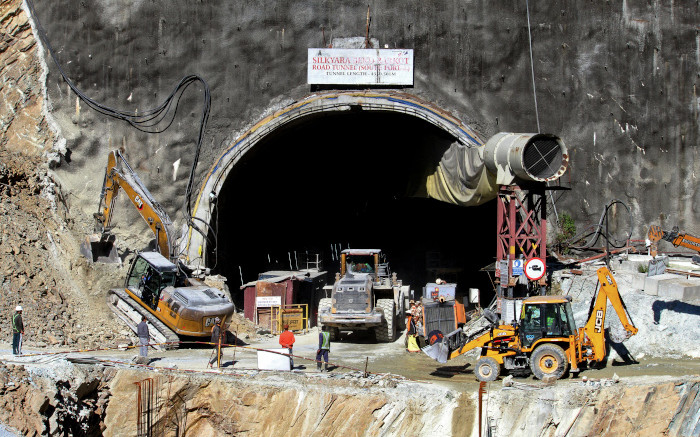
Venezuelan President Nicolas Maduro proposed at a government meeting to submit a bill to the National Assembly to create a “Guyana Esequiba” province in the region, which Guyana has administered for over a century.
FILE: Maduro issued an ultimatum to oil companies operating under Guyana’s concessions to cease their activities within three months. Image: AFP
GEORGETOWN, Guyana – Tensions between Venezuela and Guyana rose Tuesday as Caracas proposed a bill to declare a Venezuelan province a disputed oil-rich region and order the state oil company to issue licenses to extract crude oil there.
Venezuelan President Nicolas Maduro proposed at a government meeting to submit a bill to the National Assembly to create a “Guyana Esequiba” province in the region, which Guyana has administered for over a century.
He also said oil, gas and mining licenses must be granted immediately.
Venezuela held a controversial, non-binding referendum on the region’s fate on Sunday, with an overwhelming majority of 95% voting “yes” to Caracas’ plans for Essequibo, or Esequiba as it is known in Venezuela.
Maduro issued an ultimatum to oil companies operating under Guyana’s concessions to cease their activities within three months.
He also said a town bordering the disputed territory, Tumeremo, would become the headquarters of Venezuela’s efforts to defend its interests there, and said authorities would conduct a census and begin issuing identity cards, without giving details how this would happen.
Guyana said earlier on Tuesday it would seek help from the UN Security Council if Venezuela took any steps following the referendum, which Guyana tried to stop with an urgent appeal to the International Court of Justice (ICJ) in The Hague.
Guyana’s Attorney General Anil Nandlall told AFP: “Any action or attempt to take action under the referendum will necessitate a recourse to the UN Security Council as the aggrieved party.”
He said Guyana would invoke Articles 41 and 42 of the UN Charter, which may authorize sanctions or military action to maintain or restore international peace and security.
“In military terms, it is [the UNSC] “May authorize the use of armed forces by member states to assist in enforcing orders of the International Court of Justice,” Nandlall said.
“EXISTENTIAL” THREAT
Guyana has administered Essequibo for over a century. The region makes up more than two-thirds of Guyana’s territory and is home to 125,000 of Guyana’s 800,000 residents.
A legal dispute over where the borders should be is pending before the International Court of Justice.
Guyana, a former British and Dutch colony, insists its borders were established by an arbitration court in 1899.
But Venezuela, which does not accept the International Court of Justice’s jurisdiction in the matter, maintains that the Essequibo River in the east of the region forms a natural border and has been historically recognized as such.
The dispute has intensified since ExxonMobil discovered oil in Essequibo in 2015.
Caracas called the referendum on Sunday after Georgetown began auctioning oil blocks in Essequibo in August.
Guyana had asked the International Court of Justice to block the vote, seeing it as an existential threat.
On Friday, the court ordered Caracas not to take any action that could impact the disputed territory, but did not grant Georgetown’s request for urgent intervention.
Instead, it was decided that Venezuela should “refrain from taking any action that would alter the situation currently prevailing in the disputed territory.”
On Sunday, Guyana’s President Irfaan Ali warned that it would be a great injustice to the Venezuelan people if Venezuela were to ignore the court order because this path would ultimately lead to the suffering of the Venezuelan people.
Voters were asked to answer five questions in the referendum, including whether Venezuela should reject the 1899 arbitration decision and the jurisdiction of the International Court of Justice.
They were also asked whether the people – currently Guyanese – of a new “Guyana-Esequiba state” should be granted Venezuelan citizenship.






Recent Comments